 FOR IMMEDIATE RELEASE
FOR IMMEDIATE RELEASE
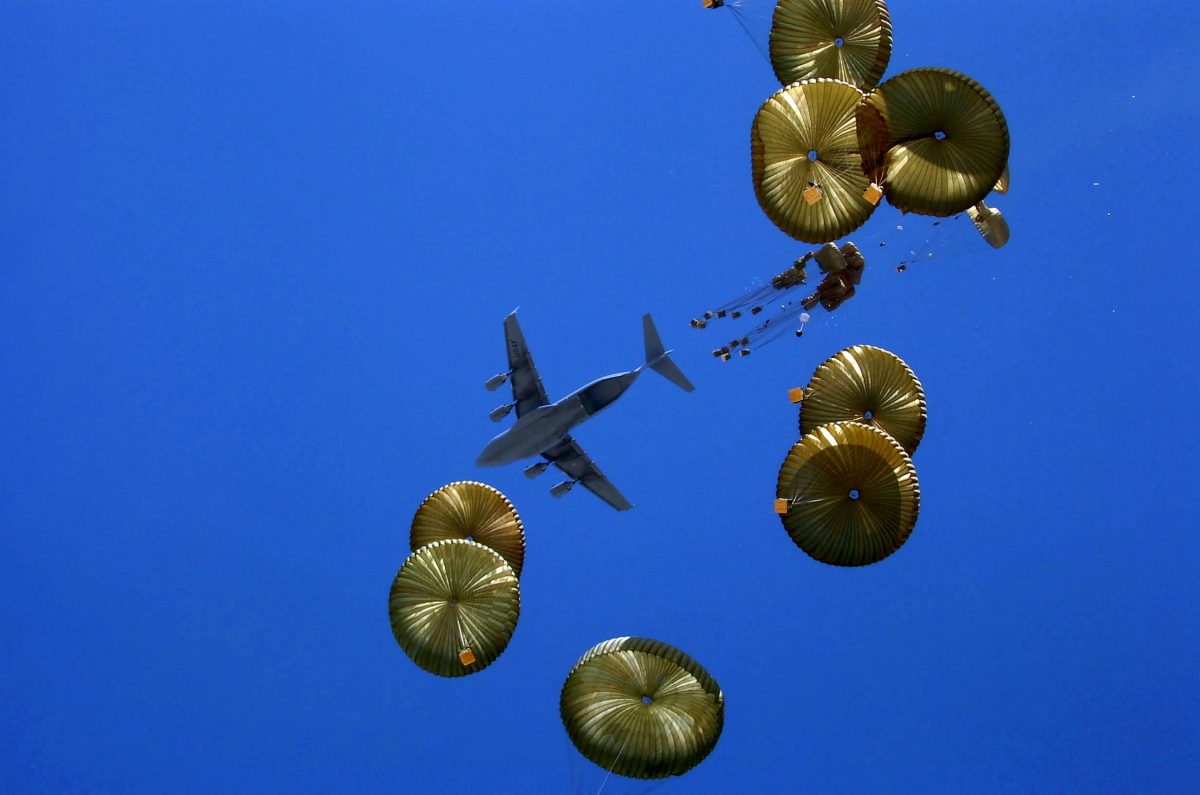

 FOR IMMEDIATE RELEASE
FOR IMMEDIATE RELEASE
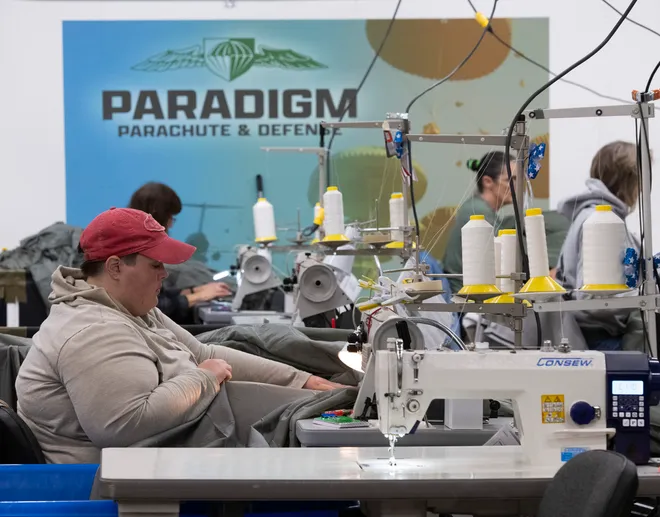
A Pensacola small business is providing critical equipment for members of the military, while also providing critical jobs to people in the local workforce.
Paradigm Parachute and Defense Inc., a small business owned by a service disabled veteran that was founded in 2019, provides high-quality, precision manufactured, military-style parachute systems. The business was launched by Aaron Nazaruk and Alex Alvarado, two veterans who picked the Pensacola area for their start-up because of Pensacola’s industrial sewing history.
Now, a new grant aimed at helping Northwest Florida businesses grow and innovate will allow Paradigm to double its manufacturing capabilities and create new jobs in Escambia County.
In case you missed it:Nonprofit that houses the homeless cancels Pensacola expansion due to landlord disinterest
More from FloridaWest:FloridaWest has a new, 5-year strategy for bringing jobs to Pensacola. Here’s the plan:
FloridaWest Economic Development Alliance, in partnership with the University of West Florida, recently helped Paradigm obtain a small business a grant from the Industry Resilience and Diversification Fund. The fund was established by the Florida Legislature, the Florida Department of Economic Opportunity and UWF to help Northwest Florida businesses grow, innovate and thrive.
The funding will allow Paradigm to increase the company’s manufacturing capacity and create 28 new jobs over the next five years. 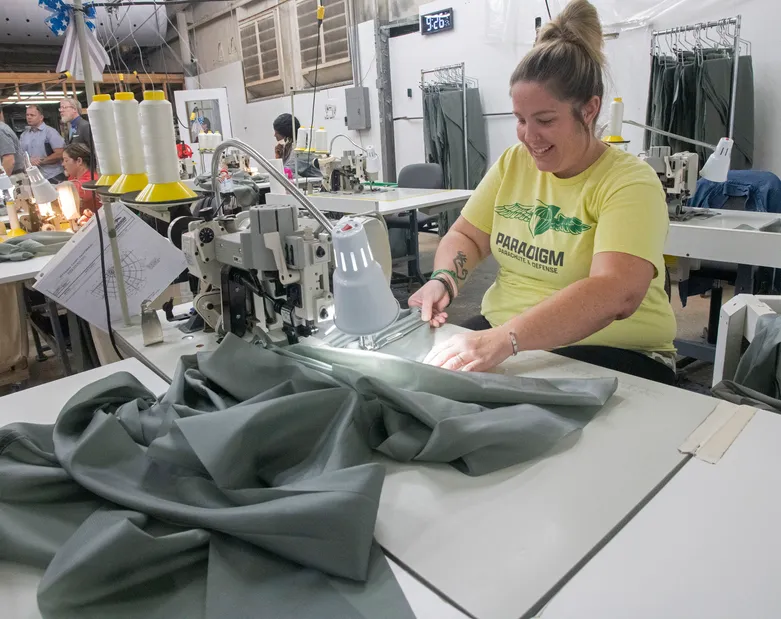
“We’re thankful for the opportunity as a startup manufacturer that does this type of business. It can be difficult to receive the necessary funding conventionally to support this type of growth,” Nazaruk told the News Journal. “We’re pretty excited that the local community and local organizations are willing to step in and help us achieve our goals. All the grant funds are used for job creation and to pay the wages of those jobs created.”
Some of Paradigm’s employees are veterans with rigging experience, sewing backgrounds, and individuals trained or licensed to pack, maintain or repair parachutes.
Others come in with no experience, but Paradigm offers a training program that teaches employees how to sew parachutes.
Nazaruk, CEO of Paradigm, said it can sometimes be difficult for veterans, especially disabled veterans, to find jobs in civilian world, because they often have specific technical skills which can be hard to use outside of the military. He said paradigm helps bridge that gap.
“It’s always good to provide those opportunities — especially being the one hiring,” Nazaruk said of helping veterans learn new skills and trades. “Being able to understand where these types of applicants are coming from, what types of settings they have experience in and what they may be able to excel at, that others might not see on the surface.”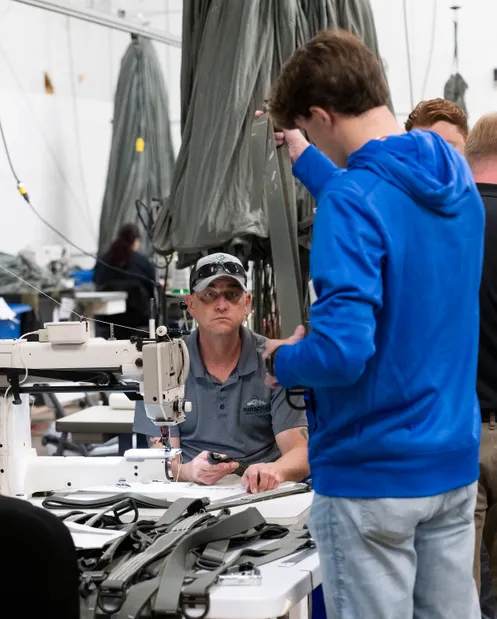
Charity Pottker, a veteran, said she was looking for work, but wanted an environment where there weren’t necessarily a lot of people, office politics and drama.
Pottker took a position as a laser cutter for Paradigm, noting, “This is ideal, because it’s just the laser, and I just cut all night or all day, but I love it.”
Another employee, April Moore was looking for a job and when she came across Paradigm and saw the things they were creating by hand. She though it was interesting and wanted to be a part of it.
Moore is not a veteran and has never sewn before, but now 11 months on the job she is one of the top sewing operators in the company.
“I have learned a lot — and not just from the sewing — all the way down to all of the attachments and everything that we put on the parachute,” Moore said. “So it has definitely 100% helped me. When I started I could not sew at all, and I can sew clothes and everything now.”
FloridaWest CEO Scott Luth worked with Nazaruk and Alvarado to help them find funding to grow their business. 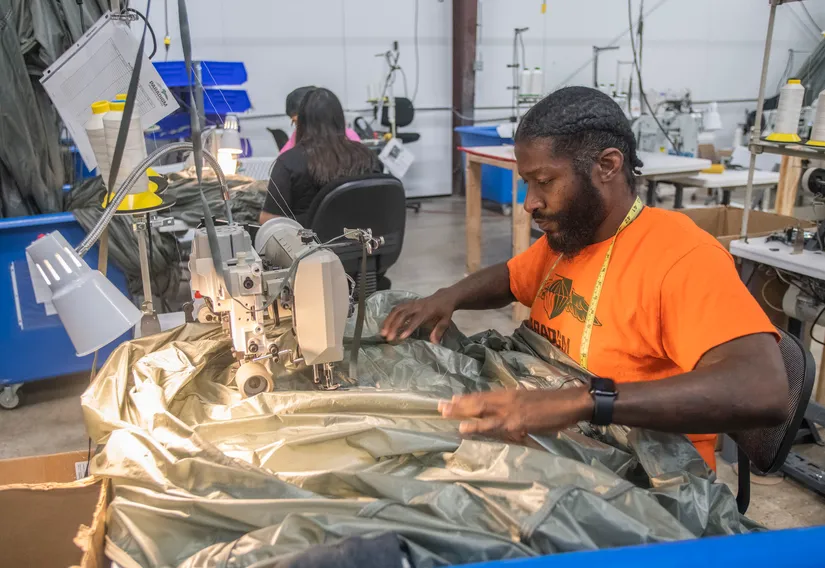
“Our retail community primarily sells back and forth to existing customers within the community, where a manufacturer like this sells their products and services outside and then brings those dollars into the community,” Luth said. “And so that’s the significance of helping a company like this expand.”
The University of West Florida manages the Industry Resilience and Diversification Fund, a regional economic development program with the goal to distribute $10 million in funding to businesses seeking to create jobs in Northwest Florida.
According to UWF, previous grants have gone to Navy Federal Credit Union for creating 9,144 jobs by 2030 and spurring over $700 million in new capital construction, ST Aerospace for creating 500 jobs and partial funding for a hangar facility at Pensacola International Airport, and International Paper for the addition of 436 jobs.
Nazaruk said he is very thankful for the opportunity to expand because as a startup manufacturer it can be difficult to obtain the necessary funding to support this type of growth without the help of the community.
“It’s been very beneficial and fulfilling to be able to start a company like this and support the community with job creation,” Nazaruk said. “And also at the same time, it’s very personally fulfilling to continue to serve our country and our country’s needs and support the military as well.”
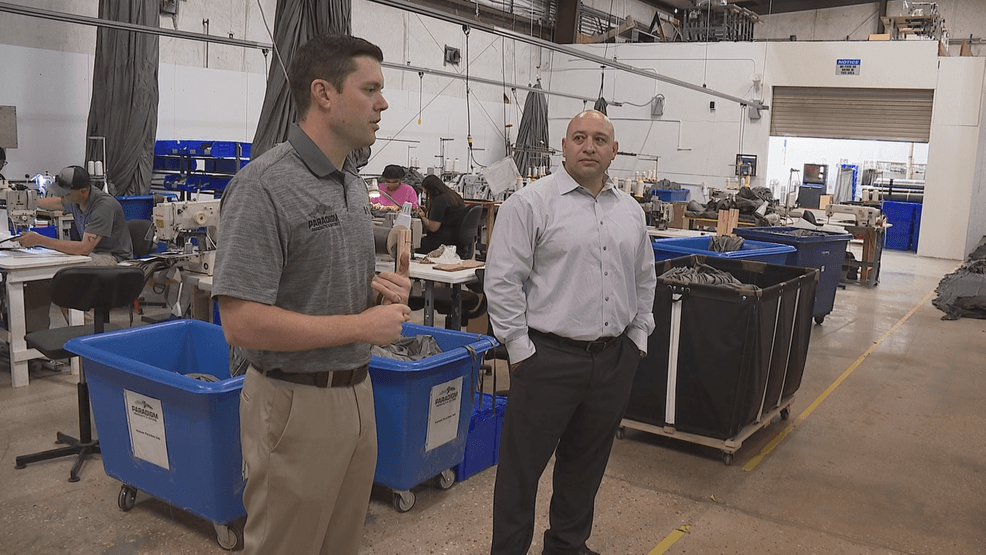
PENSACOLA, Fla. — A small business run by veterans is growing.
Paradigm Parachute & Defense sews parachutes and other textile accessories for parachute systems for the military.
The company has been around for three years.
They recently were awarded a grant through the “Industry Resilience and Diversification Fund.”
The grant was made possible by a collaboration between “Florida West” and the University of West Florida.
“Programs like this are important to enhance small business success in the area,” CEO Aaron Nazaruk said. “It also helps us better invest in the employees that are truly doing the hard work to keep our small businesses in our country on their feet.”
The company will be able to add 30 jobs to the Pensacola area thanks to the grant.
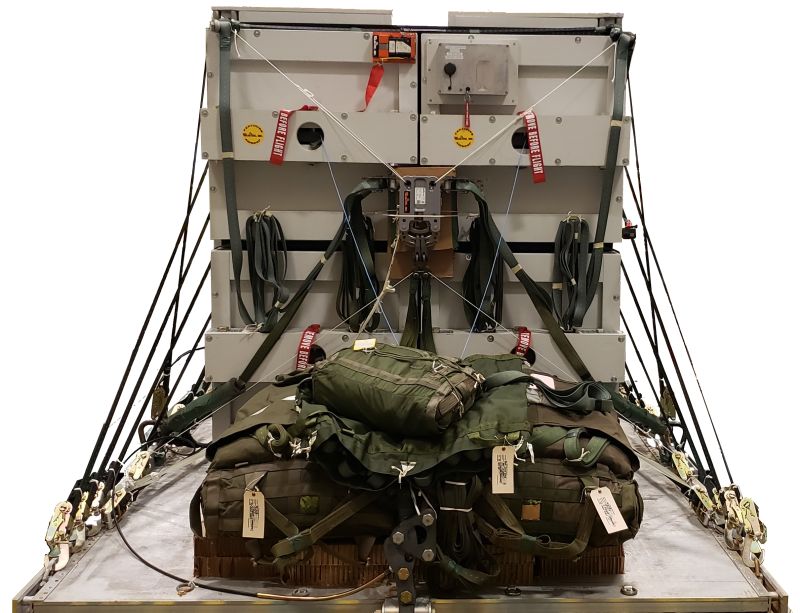
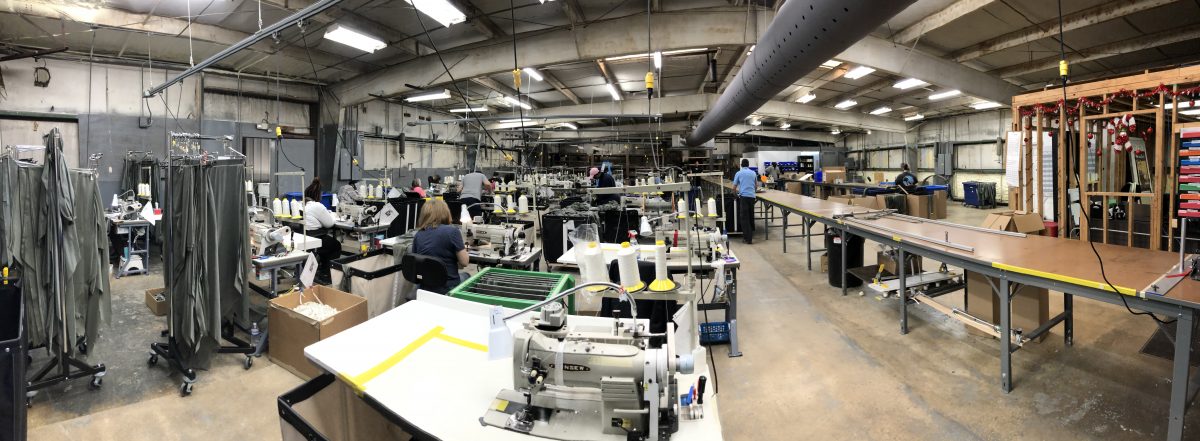




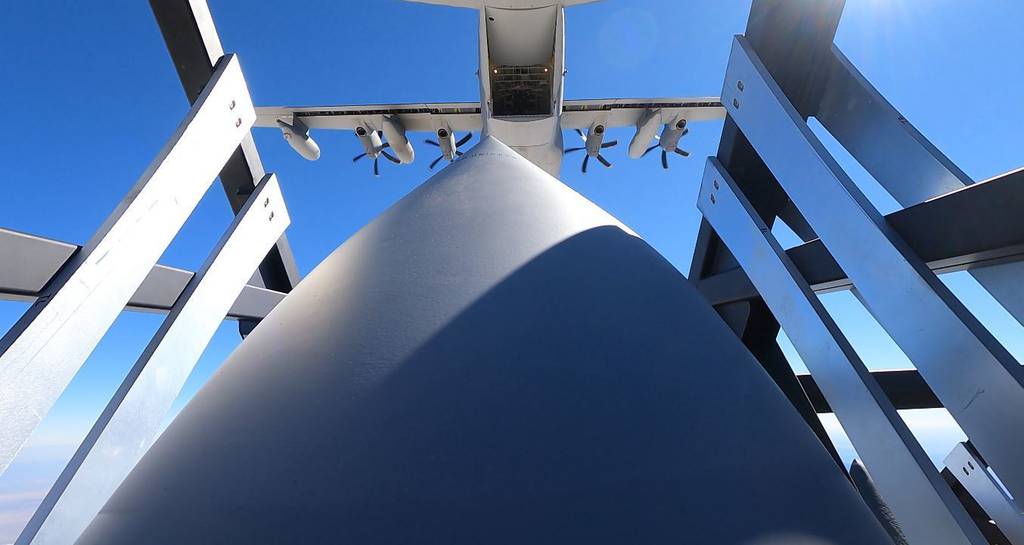
WASHINGTON — The U.S. Air Force on Thursday destroyed a target in the Gulf of Mexico with a cruise missile launched from the back of a cargo aircraft, marking the first live-fire test of its Rapid Dragon program.
The final flight test of Rapid Dragon, which took place at the overwater test range at Eglin Air Force Base in Florida, marks a step forward in the Air Force Strategic Development Planning and Experimentation office’s “bomb bay in a box” effort to develop a palletized munition system.
The Air Force Research Laboratory said in a Thursday release the program could lead to the U.S. and allies being able to turn cargo aircraft into heavily armed bomb trucks, as well as give combatant commanders more firepower to turn on enemy targets from a safe distance.
Last month, the Air Force carried out a similar test with an unarmed long-range cruise missile separation test vehicle, which had no warhead or engine.
This time, the cruise missile carried by an Air Force Special Operations Command MC-130J Commando II aircraft was armed, AFRL said in the release. The battle management system on the MC-130 received new targeting data in-flight, and then that data was routed to the cruise missile flight test vehicle. This was the first time new targeting data was received and uploaded to a live cruise missile during a flight.
When the MC-130 had reached the drop zone over the Gulf of Mexico, its crew airdropped the palletized munition system containing a single cruise missile, and three weights simulating the mass and shape of cruise missiles.
A parachute deployed to stabilize the falling Rapid Dragon system, and the missile and three dummy weights began to release sequentially to avoid collisions. The way in which the cruise missile separated from the deployment box this time was “unconventional,” AFRL said — it deployed vertically, with its nose down.
The cruise missile immediately sprung its wings and tail, got aerodynamic control of itself, fired up its engine and pulled up under the engine’s power. It then headed toward its target, which it destroyed upon impact, AFRL said.
Now that AFRL proved it can deploy a cruise missile in this way, it hopes to show the palletized weapon system can work with other aircraft. The next Rapid Dragon experiment is scheduled for spring 2022 in a live-fire test with a cruise missile from a C-17 Globemaster.
AFRL said the retargeting methods developed for Rapid Dragon are meant to be adaptable to other strike and mobility platforms. Airmen would be able to roll Rapid Dragon on or off a mobility aircraft without modifying the plane, AFRL said last month.
The Air Force hopes to further broaden Rapid Dragon’s capabilities so the carriage can house additional weapons systems and multiple types of weapons. Two years from now, the Air Force wants to bring this program from a developmental prototype to an operational prototype.
AFRL pointed to the quick development of Rapid Dragon as an example of how government and industry can quickly produce results when collaborating. This live-fire test came five months after the Rapid Dragon team conducted a system-level flight test, which itself came 10 months after the Air Force and its industry partners designed it.
Rapid Dragon has held five flight tests on three different aircraft — the MC-130J, the EC-130SJ and the C-17A — over the last five months.
“This type of experimentation campaign, that address[es] capability gaps and demonstrates transformative efforts, helps us shape future requirements and reduces timeline to fielding,” AFRL Commander Maj. Gen. Heather Pringle said in the release. “This approach ultimately enables a rapid fielding alternative to traditional lengthy acquisition timelines.”
Other contributors to the recent test include the Naval Surface Warfare Center Dahlgren, the Standoff Munitions Application Center, Lockheed Martin Missiles and Fire Control, Systima Technologies, R4 Integration, and the Safran Electronics and Defense subsidiary Parachutes USA.